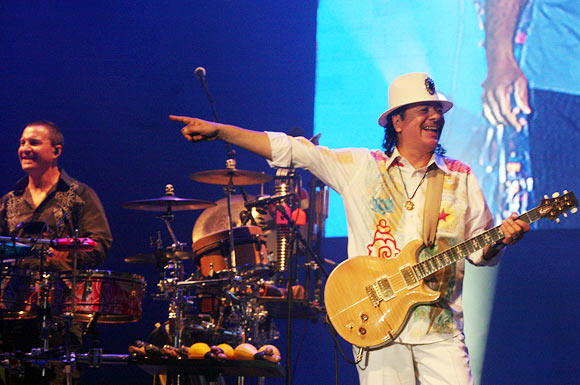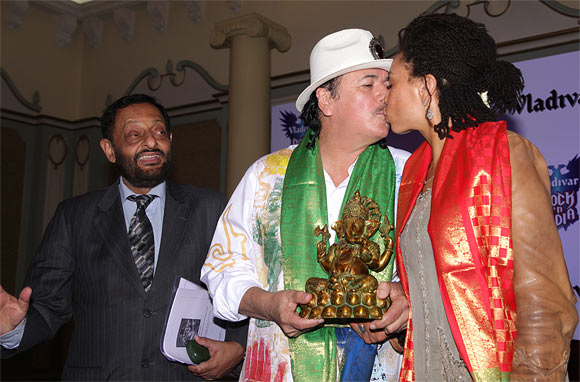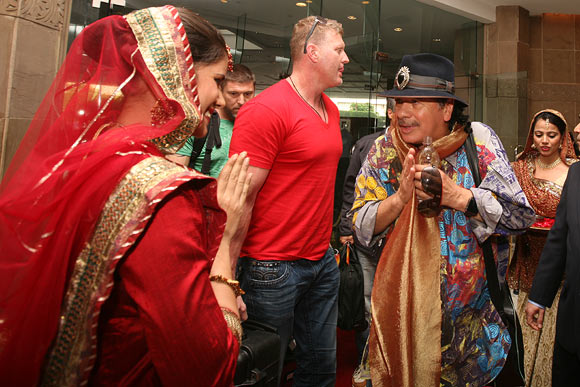Photographs: Qamar Sibtain/India Today Group/Getty Images Sumit Bhattacharya in Bangalore
Sumit Bhattacharya attends the Carlos Santana concert in Bangalore, and finds his cynical cells fighting a losing battle to the happy molecules in his brain.
"Like a bee might carry pollen, we carry the principles of the Sixties. We don't apologise for it," Carlos Santana said at his pre-concert press conference in Bangalore. "Because in the Sixties, we believed -- that world peace was possible. We believed in the principles that Mahatma Gandhi or Mother Teresa (believed in)... We believed that we could utilise music to really heal this planet, especially people's consciousness."
About coming to India, the legendary guitarist said, "We come here to reconnect with your heart and remind you of something that we learned from you. That we are -- first, middle and last -- we are light. And with that we can implement around the world something that religion and politicians have failed to do."
At his concert in Bangalore -- and I am sure in Delhi, too, I wasn't there but have heard raves -- the 65-year-old guitar god showed fans that whatever he might do in the studio, live, his music is a vehicle.
It's about taking the audience on an emotional, psychedelic journey. When it is over, you feel like you've emerged from an intense workout. Probably the most hardened cynic feels some connection to something deeper.
The band started off like bubbling lava to tanpura drones, erupting into an extended version of Yaleo, at the Vladivar India Rocks event. And for the next two hours and 15 minutes, the music never stopped for even five seconds. Not for applause, not for change of songs, not for anything except one rare introduction to a song.
Songs became medleys, medleys became solo sections, and the music became an energy that reverberated through your body, making you move in sync -- without trying -- with the person moving next to you.
That transcendental music -- that fusion of Latin rhythms, African melody, rock energy and jazz sophistication -- is really that infectious.
'If you remember only one thing tonight, let it be that you are meaningful, significant'
Image: Mr and Mrs Santana"If you remember only one thing tonight, let it be that you are meaningful, significant," Santana said as part of his guru-esque spoken-word section in the middle.
He talked of the oneness of the teaching of the seers of the music world -- like John Lennon, Bob Marley, John Coltrane, Ravi Shankar. The music was a halo of blinding light behind the words.
"We will play yesterday, today and tomorrow," Santana had told me in an e-mail interview. He did -- from the instrumentals like Samba Pa Ti, Europa and Toussaint l'Overture to the hits (like Black Magic Woman, Oye Como Va, Smooth, Maria Maria, Corazon Espinado) to a fierce drum-and-bass section in the middle featuring Cindy Blackman Santana, to Coltrane's A Love Supreme, to The Beatles' While My Guitar Gently Weeps.
Mrs Santana -- who Carlos had proposed to onstage, after she finished a drum solo while playing with his band, in July 2010 -- is a fine drummer, having played with people like Lenny Kravitz.
But that rhythm section behind her husband can probably make dead men dance.
Dennis Chambers on drums, Raul Rekow on congas and percussion, Karl Perazzo on timbales and percussion, Benny Rietveld on bass -- when they go to work on your body through your ears, you move without wanting to.
'I learnt to meditate, I learnt to change my diet, I learnt to discipline my mind'
Image: Carlos Santana during a press conference in New DelhiPhotographs: Parveen Negi/India Today Group/Getty Images
All the songs were extended versions, and the rest of the band -- David Mathews on keyboards, a superb horn section of Bill Oritz (trumpet) and Jeff Cressman (trombone), Thomas Maestu on guitars, Tony Lindsay and Andy Vargas on vocals -- too played every song with the infectious improvisatory cohesiveness that only the best of Afro-Cuban music can achieve.
Like true greats, their music was less about showing off and more about feeding the vibe -- the vibe that made cynical cells fight a losing battle to the happy molecules inside you.
Science has begun to document the profound effect music can have on the human brain, and with enough studies I am sure it can be proven that listening to Santana live leads to involuntary twitching of the limbs and a rush of happiness-inducing chemicals.
Just keeping time with that pulsating music for two hours can leave you drained, forget playing it when you are 65.
"Mick Jagger used to say I can't get satisfaction," Santana quipped at the press conference. "I don't know if he's got satisfaction now, but I have. I get satisfaction because I learnt to meditate, I learnt to change my diet, I learnt to discipline my mind. So that when I play music, it's more than Mexican, or American, or Cuban... Music is not the Olympics. It's not World Cup football. Music is harmony, unity, and complimenting."
That open spirit was evident even in the way he interacted with the Indian bands, Indus Creed and Soulmate, who opened for him in Bangalore and Delhi respectively. During Indus Creed's set -- which was plagued by sound engineering issues, that perennial problem opening bands in India face -- Santana stood in full view of the audience, swaying to the music.
In Delhi, he strapped his guitar on and played a song unannounced with Soulmate and invited Tipriti Kharbangar and Rudy Wallang, vocalist and guitarist of Soulmate respectively, to sing with him.
Which global rock star does that?
There were families with children, there were the young and restless
Image: Crowd at a concert of Carlos Santana in DelhiPhotographs: Qamar Sibtain/India Today Group/Getty Images
By the time the band launched into the concert-closing Soul Sacrifice, the roughly 10,000 people at the lovely venue on the outskirts of Bangalore -- there was enough space to hang back and enjoy the music without being crushed -- were all moving.
Strangers had become friends, hands in the air, roaring in approval together.
There were people from Chennai, from Kolkata, from Mumbai, even from Delhi -- from all age groups. There were families with children, there were the young and restless, heck there was even a person in a walker, with five huge bodyguards.
The concert got over like it began -- without warning. Suddenly, Louis Armstrong's It's a Wonderful World had filled the air, the lights had come on.
There was complete chaos on the way out, due to total non-management of traffic out of the parking lots, and the cars pile-up lasted at least for at least a couple of hours.
But not too many people were complaining, or honking too much.
Many started their own little parties around their parked cars. In most people's eyes, you seemed to see a bit more of tolerance.
Or, maybe, Carlos Santana had succeeded in healing your consciousness.





Comment
article